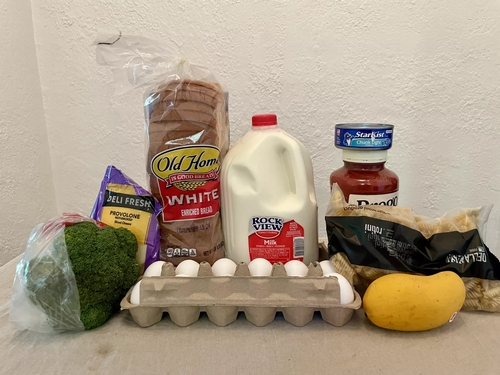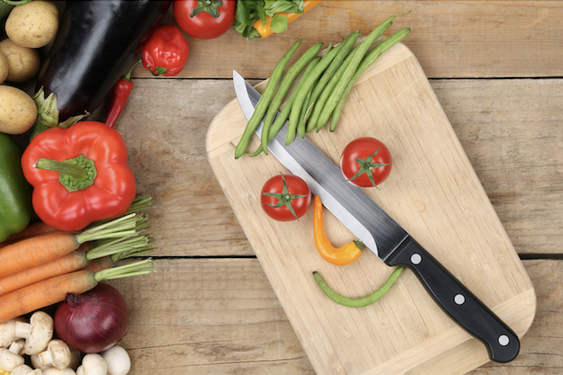Eva Roy was destined for a career in medicine. Her father, Bhola Roy, is a fourth-generation doctor, and it was only natural that she would follow in his footsteps.
She also knew that becoming a doctor is hard work. At the University of Pittsburgh School of Medicine, students are hit with a tremendous amount of information and are expected to learn it in short order.
"It's just all very quick," says Roy, 25, who is in her third year of med school.
What the Upper St. Clair native didn't anticipate was that there would be so little instruction on diet and nutrition. While medical students learn plenty about anatomy, biochemistry and pharmacology, there is little discussion of "food as medicine." The knowledge gap on the connection between nutrition education and patient health is so significant that the Harvard Law School Food Law and Policy Clinic recently did a study on it.
"It's just sad," says Roy, who grew up in the kitchen with her father and still cooks with him on weekends.
So when she heard about a "mini elective" on culinary medicine being offered to first- and second-year medical students, she signed up. She learned so much during that January 2020 session and had so much fun doing it that she started a "Potluck Pals" cooking club with four fellow students. That lead to creation of the school's first-ever cookbook. Published last fall, it features more than 70 favorite recipes culled from classmates, faculty and staff at the school.
As Roy explains, pandemic-related social distancing and self-quarantining prevented students from meeting in person — disrupting classroom learning and making first-year students' introduction to medical school even more stressful. The cookbook, which was distributed to every freshman, aims to soften the blow. Here's the book's introduction:
"Dear Class of 2024: As you flip through the recipes, I hope you feel the joy and warmth that these recipes bring to each of us. We share these recipes with you, so they can help you make your medical school experience a little more enjoyable."
Tasty elective
Mini electives at Pitt's medical school are popular because the ungraded classes provide exposure to topics and specialties that aren't part of the core curriculum. They explore everything from palliative care communication skills to anatomic pathology to intimate partner violence.
2019's new enrichment course on culinary medicine was associate professor Joan Harvey's baby.
Dean of student affairs at the time, she'd long had an interest in exercise, nutrition and mindfulness. After doing a survey on it, she brainstormed with students about how to present the course. As luck would have it, someone knew someone at Phipps Conservatory and Botanical Gardens, which in 2018 opened its Botany Hall Kitchen for public cooking demonstrations. The two sides met, and before long, a course was in the works.
The goal, Harvey says, was both didactic and practical: Each of the three sessions would pair lectures on a certain aspect of nutrition or diet with hands-on, practical experience on how to plan, prepare and share healthful recipes.
Culinary instructors for the first session in May 2019 included Andrew Red Jacobson, executive chef at The Porch in Oakland; registered dietitian Lori Bednarz; and Rosemarie Perla of Slow Food Pittsburgh. Pediatrician Keith Somers spoke to the 16 students about medical aspects. To keep it light, each class started with snacks and ended with a shared meal they'd just cooked.
In choosing which recipes and kitchen skills to highlight, kitchen manager Tess Monks focused on the typical medical student's lifestyle. Most are very busy, often strapped for cash and don't have a lot of cooking skills. Instructors also had to consider what food items would be easily accessible on campus.
"It was a lot of cooking 101," she says, along with instruction on cutting and cleaning techniques, tips on seasoning and advice on portion control.
Students walked away with a better understanding of the interplay between nutrition and health — and they had fun. So much so, that when Roy took the elective in January 2020 with Phipps culinary instructors Amy Reed and Chris Cox, she decided to organize a culinary interest group. That way, students who couldn't snag one of the coveted spots could still pick up some pointers.
When the coronavirus hit campus last March, a third planned mini elective was canceled. So students went virtual with a "lunch talk" lecture series via Zoom, touching on topics like the importance of nutrition on gut health.
The cookbook idea started brewing last spring. The pandemic had left students feeling disconnected, so Roy reached out to classmates Maria Evankovich and Maxine Fenner, who were also part of the culinary interest group. Would they ask everyone they knew for their favorite recipes and compile them in a book over the summer?
"We basically sent an email to everyone in the medical school," recalls Fenner, a second-year med student from Long Island, New Y.
They were blown away by the response. Everyone from Jack Schumann, director of medical anatomy, to Joseph Lossee, associate dean for faculty affairs, replied, along with dozens of classmates.
Many of the recipes are globally inspired, a reflection of the school's diversity. Many dishes are healthy — Roy submitted a turkey burger recipe while Fenner offered up one for chicken fatijas — while others are decidedly not. But that's OK, says Evankovich, "because sometimes you need something healthy for the soul," like Dr. James Johnston's family recipe for marble brownies.
Each recipe comes with a "best time to make" notation so students know if it's better suited to vacation cooking or marathon study sessions, for example. The recipes also includes tips on where to shop for ingredients and other suggestions to make cooking more economical, quick and easy.
Seeing the passed-on recipes all together made everyone proud, says Evankovich, a second-year student from Franklin Park.
"We wanted to welcome the first-years, and pass along things that have helped us through our journey," she says."Some of these recipes have gotten us through a long night of studying!"
"Food and cooking is so important, and as med students we forget that," says Roy. "But it's so integral to being a good docctor."
———
MOROCCAN CHICKPEA STEW
PG tested
This recipe comes together fairly quickly, is packed with nutrition and feeds a crowd. For a stew that's not as thick, use about 1 pound of spinach.
1/4 cup olive oil
3 large onions, sliced thin (about 7 cups)
1-inch knob fresh ginger, peeled and finely chopped
2 28-ounce cans whole tomatoes, drained and chopped, juice reserved
1 15-ounce can coconut milk
2 15-ounce cans chickpeas, rinsed and drained
1 cup raisins
1 lemon, juiced and zested
3/4 teaspoon ground cumin
2 teaspoons turmeric
1/2 teaspoon ground coriander
1 1/2 pounds fresh spinach
Heat oil over medium heat in a large heavy kettle. Add onions and chopped ginger, and cook, stirring occasionally, until deep golden brown, about 5 minutes.
Stir in tomatoes with reserved juice, coconut milk, chickpeas, raisins, lemon juice and zest, ground cumin, turmeric and coriander. Bring to a simmer.
Cook stew for about 30 minutes, or until liquid is thickened slightly. Stir in spinach, a heaping handful at a time, and cook until wilted and tender.
Serve hot. Serves a crowd.
— Dr. Joan Harvey, "University of Pittsburgh School of Medicine's Cookbook 2020."
SPINACH FETA TURKEY BURGERS
PG tested
Pitt medical student Eva Roy makes these low-fat burgers in a panini grill, which reduces the cooking time. The recipe can also be used for meatballs.
2 pounds ground turkey
2 eggs, beaten
1 red onion, peeled and chopped
8 ounces crumbled feta cheese
2 10-ounce boxes frozen chopped spinach, thawed and squeezed dry
Garlic salt
Toasted buns, for serving
Heat an outdoor grill or an indoor grill such as a Cuisinart Griddler to high heat (about 450 degrees).
Mix ground turkey, beaten eggs, chopped onion, feta cheese and chopped spinach in a large bowl.
Form turkey mixture into 4-6 patties, depending on how large you like your burgers.
Grill until no longer pink in the center, about 10-15 minutes.
Transfer patties to buns, sprinkle with garlic salt and serve with the toppings of your choice.
Serves 4 to 6.
— Eva Roy, "University of Pittsburgh School of Medicine's Cookbook 2020."
GRANDMA FLO'S MARBLE SQUARES
PG tested
Dr. James Johnston, professor emeritus at the University of Pittsburgh, got this family favorite from his paternal grandmother, Florence Johnston. "I always make it for holidays and love watching it disappear," he says.
8 ounces cream cheese or Neufchatel cheese, softened
2 1/3 cups sugar, divided
3 eggs, divided
3/4 cup water
1/2 cup margarine or unsalted butter
1 1/2 ounces unsweetened baking chocolate, chopped
2 cups all-purpose flour
1/2 cup light sour cream or Greek yogurt
1 teaspoon baking soda
1/2 teaspoon salt
6 ounces chocolate chips
Preheat oven to 375 degrees. Grease and flour a 15-by-10-inch baking dish or pan, and set aside.
In medium bowl, combine cream cheese and 1/3 cup sugar and blend well. Fold in 1 egg and set aside.
Combine water, margarine or butter and unsweetened baking chocolate in a medium sauce pan and slowly melt over low heat.
When everything has melted, remove pan from heat and add remaining 2 cups sugar and flour. Mix well to combine.
Blend in remaining 2 eggs, sour cream or yogurt, baking soda and salt.
Pour batter into prepared pan. Using a spoon, uniformly spoon cream cheese mixture over the chocolate batter.
Cut through the batter lengthwise and widthwise to create a marble pattern with the cream cheese mixture. Cuts should be about 2 inches apart. (I used a knife to swirl the batter in circles.)
Sprinkle top of brownies with chocolate chips. Place in oven and bake for 25-30 minutes, or until an inserted toothpick comes out clean.
Cool brownies on a rack, then cut into squares and enjoy.
Makes about 20 large brownies.
— Dr. James R. Johnston, "University of Pittsburgh School of Medicine's Cookbook 2020."
___
(c)2021 the Pittsburgh Post-Gazette
Visit the Pittsburgh Post-Gazette at www.post-gazette.com
Distributed by Tribune Content Agency, LLC.




